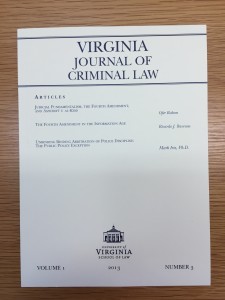 Date of Publication: Fall 2013
Date of Publication: Fall 2013
Articles:
Ofer Raban, Judicial Fundamentalism, the Fourth Amendment, and Ashcroft v. al-Kidd
Find on Westlaw
Abstract: The Supreme Court’s opinion in Ashcroft v. al-Kidd is a classic of judicial fundamentalism. The decision held that the former U.S. Attorney General was immune from a lawsuit alleging he misused the Material Witness Statute as a pretext for detaining individuals suspected of terrorist activities. The article argues that the decision is based on an untenable interpretation of precedent, and is rooted in a fundamentalist judicial philosophy long advocated by Justice Antonin Scalia, who wrote the opinion. The article then surveys the potential impact of the decision on Fourth Amendment protections, and concludes with brief remarks on the intellectual foundations of Scalia’s judicial philosophy.
Ricardo J. Bascuas, The Fourth Amendment in the Information Age
Find on Westlaw
Abstract: In 2013, the Supreme Court tacitly conceded that the expectations-of-privacy test used since 1967 to assess claims of Fourth Amendment violations was inadequate. It asserted that the previous property-based test for Fourth Amendment violations had never–despite widespread agreement to the contrary–been overruled. The Court compounded its artfulness by applying a new, significantly weaker trespass test that, like the expectations-of-privacy test, enjoys no legal pedigree. This new trespass test, which is to be applied together with the expectations-of-privacy test, suffers from the same defect as the test it purportedly supplements. It does not require the government to respect private property rights absent probable cause. Part I describes Olmstead v. United States, an early missed opportunity to have created a pragmatic Fourth Amendment trespass test that set the stage for the unpredictable and unprincipled jurisprudence that Justice Brandeis’ ill-conceived dissent later inspired. Part II explains how the expectations-of-privacy test that originated with Katz v. United States in 1967 allowed the Court to put sensitive records and communications as well as contraband beyond the Fourth Amendment’s scope. Katz also helped turn the ever-growing number of pervasive corporations against their customers and into surveillance agents for the government. Part III demonstrates how Katz‘s superfluous and sweeping pronouncements about privacy expectations added no significant constitutional protection that the trespass test it supplanted did not already afford. Instead, it enabled the erosion of significant rights that had existed. Jones consciously perpetuates these flaws, affording courts no help in adjudicating Fourth Amendment claims involving new technology. Part IV shows that, in federal fraud cases, the Court identifies property interests using a pragmatic, flexible, common-law approach consistent with the pre-Katz trespass test. It argues that this same analysis could be applied to Fourth Amendment claims, resolving the problems that the expectations-of-privacy approach has generated.
Mark Iris, Ph.D., Unbinding Binding Arbitration of Police Discipline: The Public Policy Exception
Find on Westlaw
Abstract: Police chiefs are often confronted with having to reinstate former officers, discharged for serious misconduct, after their discharges are reversed through arbitration. Such arbitral decisions are presumably binding, with no appeal. There are strong case law precedents affirming the concept of judicial deference to arbitral decisions; state and federal statutes appear to afford few options. Nonetheless, some state courts allow judicial reversal of presumably binding arbitration decisions when those decisions appear to contravene a clearly defined public policy. State courts vary in their willingness to exercise this option. This article examines case law for public policy exceptions in six states showing a wide degree of variation on this dimension: Pennsylvania, Texas, Nebraska, Massachusetts, Illinois, and Connecticut.